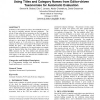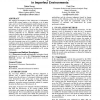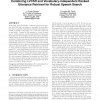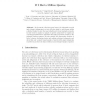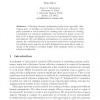CIKM
2003
Springer
14 years 5 months ago
2003
Springer
Keeping track of changes in user interests from a document stream with a few relevance judgments is not an easy task. To tackle this problem, we propose a novel method that integr...
CIKM
2003
Springer
14 years 5 months ago
2003
Springer
Evaluation of IR systems has always been difficult because of the need for manually assessed relevance judgments. The advent of large editor-driven taxonomies on the web opens the...
SIGIR
2003
ACM
14 years 5 months ago
2003
ACM
The empirical investigation of the effectiveness of information retrieval (IR) systems requires a test collection, a set of query topics, and a set of relevance judgments made by ...
SIGIR
2003
ACM
14 years 5 months ago
2003
ACM
Soboroff, Nicholas and Cahan recently proposed a method for evaluating the performance of retrieval systems without relevance judgments. They demonstrated that the system evaluat...
SIGIR
2004
ACM
14 years 5 months ago
2004
ACM
Forming test collection relevance judgments from the pooled output of multiple retrieval systems has become the standard process for creating resources such as the TREC, CLEF, and...
SIGIR
2005
ACM
14 years 6 months ago
2005
ACM
This paper examines the reliability of implicit feedback generated from clickthrough data in WWW search. Analyzing the users’ decision process using eyetracking and comparing im...
SIGIR
2006
ACM
14 years 6 months ago
2006
ACM
We consider the problem of evaluating retrieval systems using a limited number of relevance judgments. Recent work has demonstrated that one can accurately estimate average precis...
SIGIR
2009
ACM
14 years 7 months ago
2009
ACM
Well tuned Large-Vocabulary Continuous Speech Recognition (LVCSR) has been shown to generally be more effective than vocabulary-independent techniques for ranked retrieval of spo...
ECIR
2009
Springer
14 years 9 months ago
2009
Springer
As document collections grow larger, the information needs and relevance judgments in a test collection must be well-chosen within a limited budget to give the most reliable and ro...
ECIR
2009
Springer
14 years 9 months ago
2009
Springer
Abstract. Collecting relevance judgments (qrels) is an especially challenging part of building an information retrieval test collection. This paper presents a novel method for crea...
